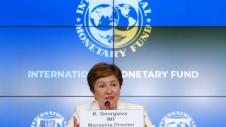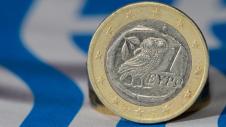Greece is heading back to reliving a fiscal nightmare and a deep recession, similar to conditions seen when the country relied on international aid, according to reports assessing the economic impact of the coronavirus.
Forecasts predict complete fiscal derailment with the deficit heading to more than 8 percent of GDP and public debt of more than 200 percent, amounting to a historic high. The pressure is coming from two sources. One concerns the contraction of GDP, which automatically raises the deficit and debt as a percentage of GDP, and the second is pressure on the budget due to higher spending and lower revenues arising from measures to support businesses and employees hit hard by the pandemic.
Of course, this time Greece will not be the only "black sheep" of the EU, as almost all countries have opened funding lines to stem the tidal wave from the virus by breaking fiscal rules and stretching the flexibility of "escape clauses".
However, the Greek economy, due to the large contribution of tourism, construction, and transport to GDP, as well as the plethora of small and medium-sized enterprises and the self-employed, is seen as suffering most. At the same time, a slow transition for the production model to recovery is anticipated.
Economy restart
Finance Ministry officials are particularly concerned with developments and, according to sources, have started working on an action plan to restart the economy with coordinated and targeted moves in sectors that are the driving force of growth.
Officials say that it will not be an easy task and that it will take time for the economy to return to normal, adding that the landscape will be completely different across the EU and that the overall framework for fiscal rules will be re-evaluated.
Even though Greek Finance Minister Christos Staikouras described the IMF's forecasts for a 10 percent recession this year as being pessimistic, the basic projection provided by the General Accounting Office sees a 5 percent contraction rate on the condition that the crisis will ease in May and that production will start operating again. Otherwise, the recession will end up being closer to the IMF forecast.
This is also what the IOBE report showed, according to which the recession could be limited to 5 percent if the economy restarts in May, but will reach 9-10 percent if the restrictive measures are maintained throughout June.
A 10 percent decrease in GDP would be the economy's worst performance and far exceed annual drops recorded during the bailout years, exceeding the 7.1 percent contraction rate seen in 2011. It should also be noted that if the above estimates are confirmed, GDP in absolute numbers will give up 19 billion euros and will land at 171 billion euros, the lowest level since 2016, when it stood at 174.2 billion euros.
At the same time, the economic quarantine opens fiscal wounds. The budget deficit, based on support measures anounced so far, will increase by at least 2 percentage points, while the introduction of more aid in coming months is seen as boosting the shortfall to 9 percent in 2020, versus a general government surplus of 0.4 percent of GDP in 2019. After last year's primary budget surplus of 4 percent, the figure is forecast to show a deficit of 5.1 percent in 2020 and 4.4 percent in 2021.
COSTAS ANTONAKOS









